
Patterson Hood: “If the song entertains me, then I tend to like it and will stick by it”
We chat to the Southern rock songwriter about the band’s latest politically charged album and the importance of protest songs
Drive-By Truckers return this month with their 11th studio album, American Band. Led by the twin songwriting talents of frontmen Mike Cooley and Patterson Hood, the band have crafted themselves a welcome role as a ballsy Southern rock band with a social conscience as big as their riffs. Cooley and Hood have been constants since the band formed in Athens, Georgia back in 1996 and have steered the way for their changing line-up, which at various points has included Shonna Tucker, Jason Isbell, Spooner Oldham and many others.
Sonically, American Band recalls Rust Never Sleeps-era Neil Young, but more importantly is the message contained within. The album has been described by the group as “a rock and roll call to arms,” as well as a defiant celebration of the fact that “America is and always has been a land of immigrants and ideals.” Ahead of the presidential election it’s an album which could anger as many as it inspires, so divisive are these time – not that Drive-By Truckers will mind.
American Band’s political content informed much of our recent conversation with Pattison Hood and gave us an opportunity to discuss the importance of art, and song in particular, during times of unrest…
Do you think you write particularly well, or more frequently, when you’re angry at the world?
“When am I not angry?! [laughs] Seems like most songs are either angry, or hurt, or lonely, or some combination of the above. Even when I’m writing from some other person’s point of view, which is often, their point of view is probably usually one of those three. All of that said, I’m actually a fairly friendly person. I’m not too bad a downer most of the time, I promise.”
Do you enjoy writing in character?
“I love doing it. I probably do it most of the time, even when the character is me, as it tends to be on this album a lot of the time.”
Will you be watching the news or reading about something and then consciously think ‘this needs to be a song’ or is it less prescriptive than that?
“I generally don’t go looking for it and it usually has to convince me otherwise. Even my worst ideas had to somehow prevail, so obviously I have an odd perspective about what should and shouldn’t be a song. I’ve heard Randy Newman, who is certainly one of my heroes, say that most of his best songs were from ideas that probably shouldn’t be songs. He phrased that all better, but I totally get that. Writing generally cheers me up and it also entertains me. If the song entertains me, then I tend to like it and will stick by it.”
Would you say it’s your duty as a writer to put what you see going on around you into your songs?
“I don’t know if it’s my duty. My duty is to write a decent song whenever possible. As I said, I generally try to talk myself out of the idea and it has to prevail – sometimes years later. Even What It Means, which is steeped in current headlines, sprung from an idea that germinated two decades ago. A similar incident that involved a neighbour of mine in Athens back in 1995 that I had sort of felt a call to write about but never quite could. Then those incidents that recently occurred had me stirred back up and I ended up writing the song really quickly. I went back and did some revising and editing but the basic song happened in less than an hour. Generally most of my best songs happen pretty fast, even if the spark is from years earlier.”
Have you been influenced directly by the political or social message of a song / album?
“More than I can count. I’m a huge Clash fan so there’s all of that. I grew up loving the protest side of music from the 60s and 70s. I always loved Curtis Mayfield’s songs, Marvin Gaye’s What’s Going On and Bobby Womack’s Across 110th Street. Same time, we’ve always wanted to avoid being blatantly preachy. I’d prefer for it to pass the Clint Eastwood test. I’m a huge Clint Eastwood fan, even though he’s an avowed Right-winger and it does sometimes influence his work, although I would argue, usually not inappropriately. I try not to talk to chairs but I can appreciate American Sniper as a work of art, even if I don’t agree with all of its politics.”

Patterson: “I always approach a song from the way my instinct tells me I should”
Can you pick your favorite political song, and tell us what makes it so successful?
“I really love Freddie’s Dead and how it used a fictional character to tell a larger story than it implies on the surface. Rock The Casbah is a fantastic single. It’s a hit and you can dance to it but it’s also political as all hell, in ways that are still timely decades later. Tom T. Hall wrote a song called Watergate Blues back in the mid-70s that extolled the virtues of George McGovern in a Nashville country song for Christ sake. His style of writing especially influenced What It Means more than anyone’s. It’s almost a throwback to that form of songwriting and his is kinda the voice I heard in my head when I wrote it. I even did the reverbed vocal thing when we recorded it, like those early 70s country hits by Tom T. and others as a further tribute to that.”
Were any of the songs on the album inspired by particular incidents that you experienced directly?
“Most of it, whether I was actually directly involved or not, I at least had to feel it enough to empathize with what the voice was saying. Guns of Umpqua is a good example. I had just moved to Portland, Oregon and had spent a night in the little town Umpqua Community College is located in on my way up there. I was home on a beautiful fall morning, sitting on my porch having my coffee and reveling at what a stunning day it was and I heard the news about the shooting. I felt like it had hit me upside the head. I was just feeling so sad and couldn’t help pondering how someone could wake up on such a beautiful morning and think ‘today, I’m going to really f**k up a bunch of stranger’s lives for no goddamned reason.’
“I carried that around for a couple of days and then wrote the song on an airplane headed back to Atlanta to go play shows with the band. In the meantime, I had probably heard that a vet had been shot so it made sense to write the song from a fictional version of what I might imagine someone who had survived a Mideast war might think if he made it home then was shot going to classes.”
How much discussion is there within the group about the topics you’re going to cover in your songs?
“Probably none before the songs are actually written. I don’t think Cooley or I knew how much common ground our new songs had until we were pretty far along and started sending them to each other and the band to learn. Same time, I could never do a record like this without everyone in the band being 100 percent behind it. Politically, artistically, musically, every way. I would never force any of my viewpoints on my band and I know Cooley wouldn’t either. I would say the band was encouraging to the point of inspiring across the board. Recording this album is one of my favorite musical experiences of my life.”
Have you ever had to pull a song as a result of disagreeing about its content?
“Not that I can remember. We tend to edit ourselves pretty heavily before taking a song before the rest of the band. We’re all very different people, but we’re pretty like-minded in those ways. The main thing is that the song pass muster. I’d never want my bandmates to think I was bringing them some shitty song. I know that whatever I write has to stand up, or attempt to stand up next to a Cooley song. That’s pretty brutal.”
There are many instances of musicians being given a hard time from their own fans when they release political music, is this something you’ve experienced?
“Maybe a little recently. Actually, maybe a little all along. Adam’s House Cat, mine and Cooley’s band in the late 80s, was banned for life from our local music festivals once, although they seemed to come around a couple of decades or so later. We’ve always said what we felt and did what we wanted. People are free to like it or not. My job is to not really think about that end of things and be true to the voice in my head and the path I’m inspired to follow.”
How much does it disappoint you that the themes of the album are ones that haven’t been addressed for so long now?
“I’d certainly prefer for someone else to be addressing them. There are certainly artist that are addressing political issues, some incredibly eloquently. Especially in hip hop, or in the case of Beyoncé, in a pop record, which is especially hard to do. Troubled times do tend to generate and inspire more music with that kind of tone and content.”
What can culture do to help?
“Hold up a mirror or tell a story that needs telling. Extol a point of view. Ask a question. Paint a picture that makes somebody feel something. Provide a voice of empathy.”

Drive-By Truckers: “We’ve never phoned it in and twenty years later, we’re still getting better”
Does the writing process differ when you’re creating more overtly political music?
“No. It would suck if I tried to approach that differently. I always approach a song from the way my instinct tells me I should, whether it’s deciding the point of view or musical style or the general tone.”
Similarly, do these themes have an effect on your sound?
“The sound always follows the song and aims to be true to the song itself. A big part of why I play with the people I play with is that they ‘get it’. I play with the people who have a similar sense of musical aesthetics and ideologies. I play with a drummer that actually listens to words. They’re all tasteful as shit, but also willing to sometimes be otherwise if the song calls for it.”
Do you enjoy recording in Nashville?
“Recording at Sound Emporium was a fantastic experience. I loved the people, the room the vibe, the history. It’s crazy that I had never recorded in Nashville after all of these years. I definitely want to cut there again.”
Did it ever feel incongruous recording such a potentially provocative record in ‘the buckle of the Bible Belt’?
“We’ve spent our entire lives in said buckle.”
Were there any other difference in terms of the writing and creation of American Band?
“It may be the first record that happened before we planned it to. We went in right before Thanksgiving, immediately after fall tour last year, for three days to just cut a few things and start the process and ended up cutting nine songs. We resumed right after Christmas and finished the album in three more days. We were done and about to mix and Cooley wrote one more song, Filthy and Fried, and we recorded that at soundcheck at The 40 Watt Club in Athens, GA then started mixing the album two days later. It was our fastest studio album since Pizza Deliverance in 1999. There was much joy in its creation. Even with the darkness of the subject matter, it was amazingly uplifting to make and hopefully will prove to be the same way playing it live. There’s a lot of light and love in these songs and certainly in our live show.”
Do Mike’s songwriting contributions take the pressure off you, and is that good for the band’s longevity?
“It’s the greatest situation in the world to me and certainly a huge reason for our longevity. Getting to be the guitar player and sometimes harmony singer on Cooley’s songs is one of my life’s biggest honours. I absolutely love every song he’s ever written and my favorites are among my favorite songs ever written by anyone. I also really enjoy the role of ‘sideman’ that I get to do during his songs – the perfect counter-balance to what I do during my songs. Plus I totally love and admire what he does to my songs. He provides a much-needed missing ingredient to the songs I write.”
Looking back over your body of work, how do you think American Band fits in?
“I think it’s definitely in the very top tier. It has easily some of our best songwriting and definitely our finest playing and singing. The band has never been tighter or more in tune with what Cooley and I are writing. Brad has really outdone himself on these sessions and is the secret weapon that allowed us to record this album so quickly and spontaneously. Jay outdoes himself on keyboards and has become a truly knockout guitar player, plus his harmonies are so right on. Matt Patton has taken on a much bigger role than before on this album, contributing not just the excellent bass parts but also some key arrangement touches that really took it all to another level.”
Lastly, how would you like Drive-By Truckers to be remembered?
“As a band that has always played each night like it was our last and a band unafraid to move forward and take chances. Sometimes it works better than other times, but we’ve made a bunch of records and I can proudly stand by each of them. Even when it hasn’t worked as well as we would have liked, it was never for lack of trying and being willing to possibly fail a little. We’ve never phoned it in and twenty years later, we’re still getting better. I’d like us to be remembered as a very good American rock and roll band.”
Interview: Duncan Haskell
American Band comes out 30 September and drivebytruckers.com has everything you need to know.



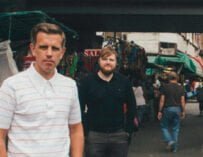
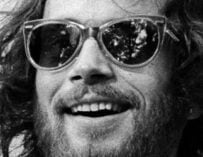
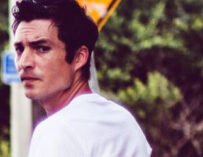
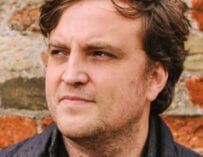

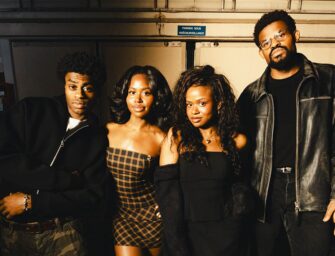

























Related Articles